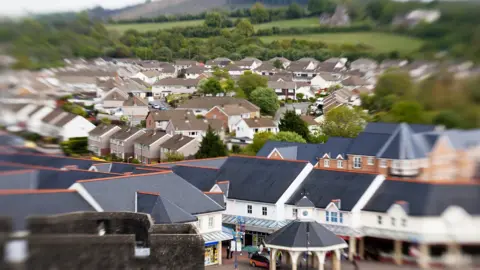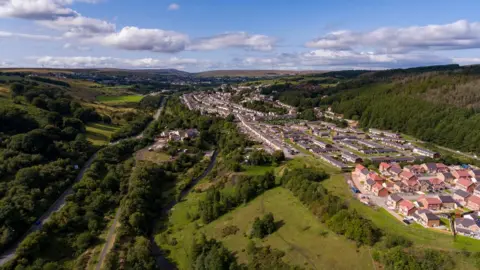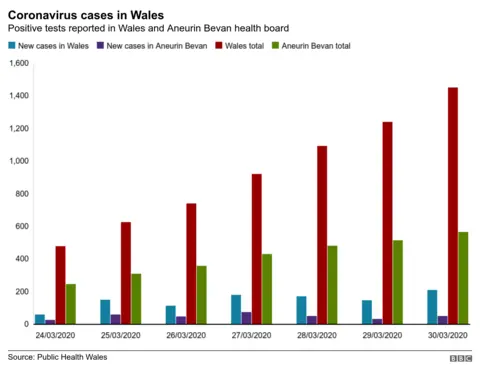Coronavirus: Why are the Gwent valleys a hotspot?
 thomas shaw/Getty Images
thomas shaw/Getty ImagesWhy have Newport and the Gwent valleys become a "hotspot" for coronavirus?
Aneurin Bevan University Health Board, which is responsible for running hospital and NHS services in the area, is fast becoming the frontline in Wales' fight against the pandemic.
Questions are being asked about why one part of the country is dealing with high numbers of patients.
Here we try to set out what we know so far.

What is the issue?
Almost half the confirmed cases of Covid-19 in Wales have been at Aneurin Bevan University Health Board, even though it only has around a fifth of the total population.
Public health officials in the Gwent valleys said they were seeing increasing numbers of people being admitted to hospitals, as well as the number of people needing intensive care and "sadly an increasing number of people dying".
 BBC/Getty Images
BBC/Getty ImagesThe area covers the city of Newport, old industrial areas Blaenau Gwent, Caerphilly and the Rhymney valley, largely rural Monmouthshire and Torfaen, which includes towns like Cwmbran and Pontypool. That's more than 591,000 people.
The health board employs 14,000 staff, including 1,000 doctors and 6,000 nurses, midwives, other professionals and community workers.
 zetat/Getty Images
zetat/Getty ImagesCould it be down to testing?
We know that Aneurin Bevan started testing its staff for coronavirus earlier than other Welsh health boards.
It came after a member of staff developed symptoms.
Dr Sarah Aitken, Aneurin Bevan's director of public health, told BBC Wales it had been testing workers in "critical areas".
"We were the first health board to do that and that certainly did give us an indication that our staff were being exposed to patients in different areas of the board's geography," she said.
First Minister Mark Drakeford says the "hotspot" can partly be explained by this staff member contracting the disease.
He said this meant earlier and more widespread testing than in other parts of Wales.
"It looks like there's more there because we've tested more people than elsewhere," he added.
But he said that was "part of the story of the Gwent outbreak" - and by no means all of it.
Chief medical officer Dr Frank Atherton has also claimed that "there has been a lot more testing" in the area and therefore the increase in the number of cases identified was a "natural consequence".
 Getty Images
Getty ImagesIs it because the area is on the border with England?
In recent days both the health board and Welsh Government have suggested its proximity to England, and the focal point of the UK's outbreak in London, have been factors.
Dr Sarah Aitken said she "had always thought it was likely we would be the first part of Wales to start to see the increase" for that reason.
"There could be a number of theories about why we are seeing more than elsewhere but I think the most likely is because the coronavirus has spread from London in a ripple - and we're the nearest part of Wales to London," she said.
Mr Drakeford has also said that "there is evidence that the disease is moving east to west across the UK and Newport is right at the eastern end of Wales".
While Dr Atherton has suggested there could be link to the London commute along the M4.
It has been pointed out, however, that several local authorities and large cities closer to London have seen lower numbers of confirmed cases so far.
Though not directly comparable - at time of writing, Surrey has 331 cases, Reading 27 cases and Bristol 78. Aneurin Bevan now has 564.
Meanwhile, other hotspots so far include Birmingham, Hampshire and Sheffield - away from London.
 steved_np3/Getty Images
steved_np3/Getty ImagesWhat about demographics?
Life expectancy is slightly below the Welsh average - but for those expecting a healthy life, it dips in more deprived areas like Blaenau Gwent (an average age of 74, compared to 81 in Wales as a whole).
Much of the valleys areas are relatively densely populated and 20% of people are over 65, but this is about the same as the Welsh average.
Dr Aitken pointed out that the "demographics of this health board are not really very different to some of the neighbouring ones".
But the Welsh Government says it believes the make-up of Wales' population could be problematic as the virus spreads.
Health Minister Vaughan Gething told a news conference recently that one of his biggest concerns was "that we potentially have a larger impact in Wales because Wales compared with other UK nations is typically older, sicker and poorer".
"On every other public health indicator it means there is more challenge," he added.

Are there other issues which have been raised?
BBC Wales has spoken to one family with particular concerns about the Royal Gwent Hospital in Newport.
They allege their elderly relative contracted the virus while being treated for a separate issue at the site and have raised questions about the measures in place to protect patients there.
It follows the death of 80-year-old Marita Edwards, whose family also say she caught the disease at the Royal Gwent.
She's reported to be the first person in Wales to die after catching the virus in hospital though it is not known how many other cases there have been like this.
The health board says there are strict infection control procedures in place at its hospitals.
Mr Drakeford said at his latest briefing: "Chance is playing its part as well."
He believes that there is some degree of randomness about the way in which these hotspots emerge.
Meanwhile, Blaenau Gwent AM Alun Davies wrote to the first minister saying "robust enforcement" must be taken against employers who are "openly flouting social distancing and lockdown instructions".

Is this just the start of the virus's spread across Wales?
This is what the Welsh Government and its advisers believe - and that the area won't be an outlier for long.
In fact, the latest figures on tests show that the proportion of total cases in Aneurin Bevan, as more people have been hospitalised elsewhere, has dropped to 39%.
For the last three days, Aneurin Bevan has not been top of the list of Welsh health boards with most new cases either.
Mr Gething said: "There is a particular cluster within the Gwent area but we don't think that this is going to be the way that disease transmission works throughout the whole outbreak.
"We're pretty confident unfortunately that the community transmission that is taking place will be seen in other parts of the UK and other parts of Wales."
Dr Atherton added that it was "a complex issue".
"But the underlying message is that the virus is circulating widely in all parts of Wales.
"At the moment it may be circulating to a higher degree in south Wales than the rest of Wales, but that may change over time - it's a very fluid, dynamic situation that we need to keep a watch on."

Why don't we know how many people have died so far in the area?
Geographical details of fatal cases from coronavirus aren't being released by Public Health Wales yet because numbers are still small - and, it says, to protect patient confidentiality. It did release locations for the first few deaths.
But for now, public health bodies are acting in unison and only releasing the breakdown on a nations and English regions basis.
What has the impact been?
In a video on social media last week, Dr Aitken warned that there was a risk the NHS system in the ABUHB area would be "overwhelmed" if people did not follow government instruction to stay at home.
"We're seeing a rapidly rising increase in number of cases in all our communities and a daily increase in the number of people being admitted to hospital and the number of people dying from the virus," she said.
"The pattern we're seeing in Gwent is the same as was seen in Italy where their healthcare system is overwhelmed."
A consultant surgeon at the Royal Gwent Hospital in Newport told BBC Wales all surgery there had already been affected.
Mr Gethin Williams said the hospital had become a hotspot for Covid-19 and that operating theatres had been changed into makeshift intensive care units in anticipation of the predicted overflow.
Before this crisis even kicked off, it had been recommended that Aneurin Bevan needed seven more intensive care beds just to keep up with normal demand as it grows.

How will they cope?
Dr Aitken said if the virus peaked over the next three weeks as some government advisers had predicted then the health board should be able to cope.
"We will need to open all the new hospital beds that we're planning to open and do things very differently," she said.
Some 350 beds are being made available at the new Grange University Hospital near Llanfrechfa, which had been set to open next year.
And urgent calls have been made on social media for temporary staff to join the NHS workforce locally.
She emphasised that it was vital people heeded government advice to stay at home in order to slow the spread of the virus.
"Slowing the spread down and meaning it does peak over the next three weeks is going to be the difference between us being able to provide care for all those people who need it, and potentially not being able to and therefore it will save many lives," she added.

- A SIMPLE GUIDE: What are the symptoms?
- AVOIDING CONTACT: Should I self-isolate?
- STRESS: How to protect your mental health
- LOOK-UP TOOL: Check cases in your area
- MAPS AND CHARTS: Visual guide to the outbreak
- VIDEO: The 20-second hand wash

